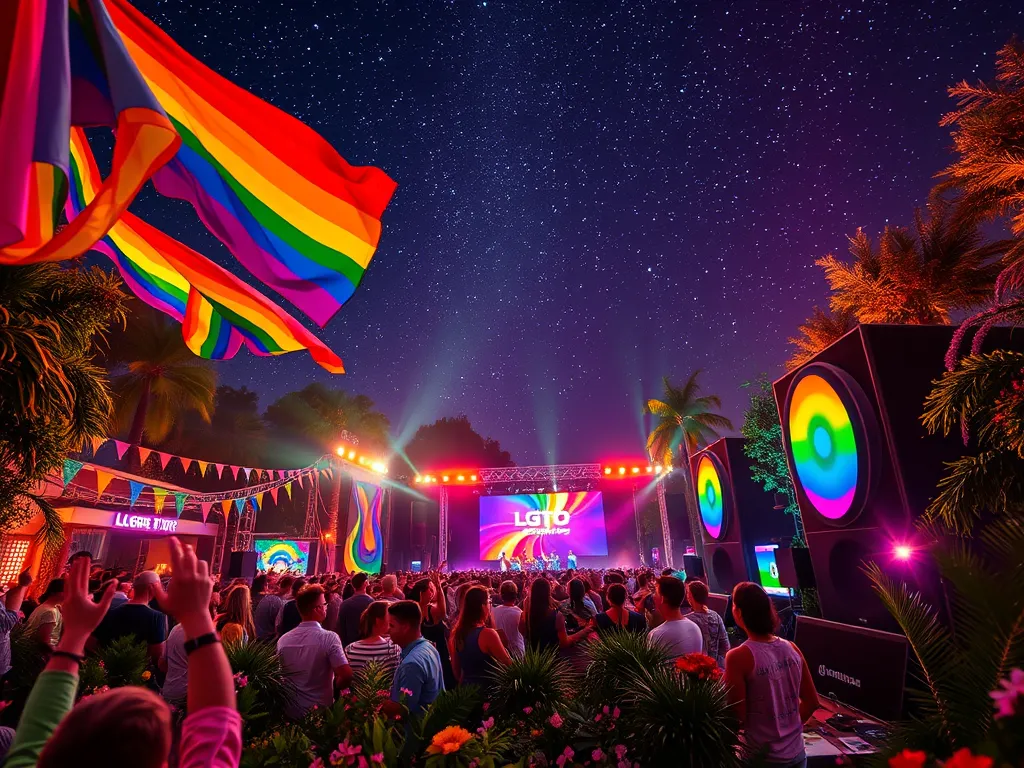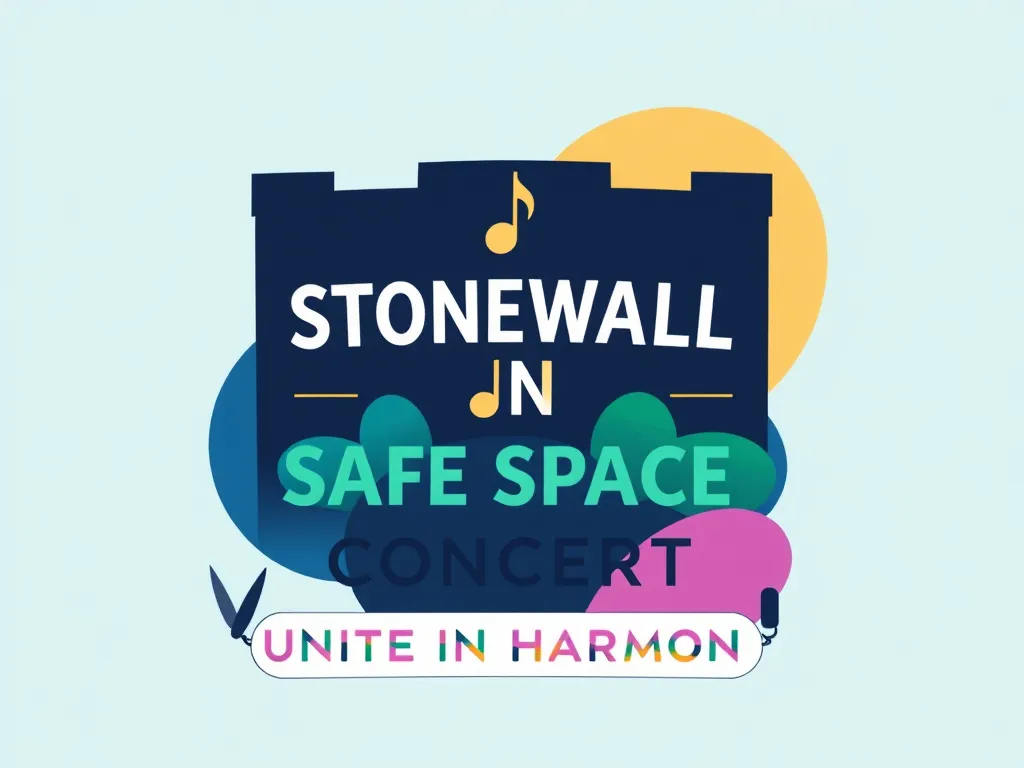Explore the Vibrancy of LGBTQ+ Inclusive Music Events

Celebrating Diversity: The Importance of LGBTQ+ Inclusive Music Events
LGBTQ+ Inclusive Music Events have emerged as vital platforms that not only celebrate music but also promote diversity, acceptance, and community among LGBTQ+ individuals and their allies. These events serve as a safe space where anyone can express themselves freely, regardless of their sexual orientation or gender identity, and enjoy music that resonates with their experiences. By fostering an inclusive atmosphere, these music events help to break down barriers and combat discrimination, making the music scene more welcoming for everyone.
Participating in LGBTQ+ Inclusive Music Events fosters community and celebrates diversity through the universal language of music.
The rise of LGBTQ+ Inclusive Music Events can be traced back to the growing awareness and acceptance of LGBTQ+ rights across the globe. As society becomes more open-minded, festivals and events have increasingly recognized the importance of integrating LGBTQ+ themes and features into their programming. This shift not only supports LGBTQ+ rights but also enriches the musical experiences for attendees, showcasing a broader range of talent and creativity that reflects diverse backgrounds and stories.
LGBTQ+ music events often feature artists who identify as part of the community, highlighting their work and talents in a supportive environment. This representation allows for powerful expression and storytelling through music, creating a deeper connection between performers and audiences. Furthermore, these events contribute to the normalization of LGBTQ+ identities in the mainstream music industry, paving the way for future generations of artists to feel confident in sharing their truths.
In addition to celebrating diversity and equality, LGBTQ+ Inclusive Music Events play an important role in community building. These gatherings create opportunities for individuals to connect, network, and build relationships, fostering a sense of belonging among LGBTQ+ individuals. Attendees can enjoy the experience of being surrounded by like-minded people, which can be particularly comforting for those who may feel isolated or marginalized in their everyday lives. Ultimately, these events serve not only as entertainment but also as a celebration of identity and pride.
As more artists, fans, and organizations prioritize inclusivity and representation, LGBTQ+ Inclusive Music Events will continue to grow in significance. The enduring celebration of these events not only infuses joy into the lives of participants but also stands as a powerful reminder of the importance of solidarity and support within the LGBTQ+ community.
The History of LGBTQ+ Music Events
The origins of LGBTQ+ music events can be traced back to the early Pride celebrations in the 1970s, which were primarily focused on activism and awareness of LGBTQ+ rights. These events often featured music as a form of expression and protest, highlighting the importance of artists within these communities. Over the years, as these Pride events expanded to include diverse celebrations of identity, the incorporation of music became increasingly central to the overall atmosphere, providing an uplifting and unifying experience for attendees.
Music has played a significant role in LGBTQ+ history, serving as an outlet for expression and a means of forging connections within the community. From the emergence of disco in the 1970s, which became synonymous with LGBTQ+ nightlife, to the later adoption of pop and hip-hop by queer artists, music has been intertwined with the movement for LGBTQ+ rights. Many songs have become anthems for activism, solidarity, and love, illustrating the power of music in fostering change and acceptance.
Over the years, LGBTQ+ music scenes have evolved dramatically, influenced by various social, cultural, and political shifts. From underground clubs to mainstream music festivals, the visibility and quality of LGBTQ+ performances have expanded, giving rise to a rich tapestry of genres and styles. This ongoing evolution reflects the growing recognition of LGBTQ+ artistry in the music industry, leading to the celebration and promotion of diverse voices and experiences.
Key Festivals and Events
Major LGBTQ+ music festivals have gained prominence over the years, with events like San Francisco Pride, Sydney Gay and Lesbian Mardi Gras, and Manchester Pride becoming internationally recognized celebrations of inclusivity. These festivals attract thousands of attendees and feature a wide array of artists, from musical legends to emerging talents. The focus on LGBTQ+ themes has allowed these events to become safe havens for the community while offering an exciting lineup of performances that resonate with the audience.
Emerging LGBTQ+ artists and DJs have increasingly found platforms at these music festivals, showcasing their creativity and talents to broader audiences. With opportunities to perform at large-scale events, many of these artists have gained traction in the mainstream music industry, paving the way for future LGBTQ+ performers. Additionally, the promotion of these artists is essential for the visibility and normalization of diverse expressions within the music scene.
The positive impact of LGBTQ+ music festivals on local communities cannot be overstated. These events often bring together individuals from all walks of life, creating economic opportunities for local businesses and fostering a sense of pride within the community. By encouraging inclusivity and acceptance, festivals help to strengthen the local LGBTQ+ network and promote a message of love, equality, and celebration.
Inclusivity and Representation
Representation in music programming is crucial for creating an inclusive environment at LGBTQ+ music events. It is essential that artists and performers from various backgrounds, identities, and genres are showcased, ensuring that a diverse range of voices is heard. By prioritizing representation, music events can validate the experiences of marginalized individuals and highlight the rich contributions of LGBTQ+ artists to the music industry.
Events that promote LGBTQ+ artists provide essential visibility and recognition, empowering these individuals to share their talents on larger platforms. By prioritizing LGBTQ+ performers, music events create opportunities for acceptance and visibility, allowing artists to inspire others through their work. This not only allows for exchange and collaboration but also reinforces the importance of inclusive spaces where varying identities can thrive and flourish.
Several strategies can be utilized by event organizers to make events more inclusive, such as implementing diverse programming, ensuring accessibility for all attendees, and engaging with local LGBTQ+ organizations. Efforts to include representation across all levels of event planning can foster a more inclusive atmosphere, ultimately making the experience enjoyable and welcoming for all.
Local LGBTQ+ Music Scenes
Notable local LGBTQ+ music venues are often at the heart of vibrant LGBTQ+ music scenes, providing spaces for artists to perform and connect with audiences. These venues may include bars, clubs, and performance spaces that cater specifically to the LGBTQ+ community. By offering a platform for local talent to shine, these establishments contribute significantly to the cultural landscape, enhancing the richness of the local music scene while fostering a sense of belonging.
Local LGBTQ+ music events can have a profound community impact, fostering relationships among attendees and creating supportive networks. Attending these events allows individuals to feel connected to their community, often leading to long-lasting friendships. Community-based gatherings serve as vital touchpoints for everyone involved, facilitating expression through music while bringing people together to celebrate shared identities and stories.
Profiles of grassroots LGBTQ+ events showcase the creativity and passion of local organizers, who often operate on limited budgets to create impactful experiences for their communities. These events may include open mic nights, poetry slams, and music showcases that spotlight the talent of local artists. Grassroots initiatives exemplify the spirit of LGBTQ+ inclusivity by ensuring that everyone can participate and contribute to the local cultural scene.
Challenges Facing LGBTQ+ Events
Security and safety concerns at LGBTQ+ music events remain a pressing issue, as incidents of violence and harassment can deter individuals from fully participating in celebrations. Organizers must prioritize safety measures, such as hiring trained security personnel and developing emergency plans, to create a safe environment where attendees can feel secure and supported in expressing themselves.
The navigation of commercialization versus authenticity also presents challenges for LGBTQ+ music events. As festivals grow in size and popularity, organizers must strike a balance between catering to commercial interests and retaining the authentic spirit that draws attendees to these events. Staying true to the core values of equality, acceptance, and representation is critical for ensuring the continued success of these events.
Addressing accessibility for all attendees is another significant challenge faced by LGBTQ+ music events. Organizers should consider the needs of individuals with different abilities, as well as factors such as transportation and affordability. Implementing accessible practices ensures that all individuals can enjoy the event and participate fully in the experience, embodying the spirit of inclusivity.
The Future of LGBTQ+ Music Events
Trends in LGBTQ+ music festivals post-pandemic reveal a continued focus on inclusivity and community-building. In the wake of COVID-19, many events have adopted innovative approaches, such as hybrid formats that allow for both in-person and virtual participation, ensuring wider reach and attendance. This adaptability presents opportunities for engagement with global audiences while ensuring that local representation remains a priority.
The role of technology in fostering inclusivity cannot be underestimated. Social media, streaming platforms, and digital tools have enabled marginalized voices to gain visibility and find audiences. These technologies not only democratize access to music but also create virtual spaces for connection and dialogue, amplifying LGBTQ+ artistry far beyond traditional venues.
Predictions for the evolution of LGBTQ+ music scenes suggest a growing acceptance and celebration of diverse identities, further integrating LGBTQ+ themes into mainstream music culture. As society continues to progress, LGBTQ+ music events are likely to expand in scope, attracting larger audiences and fostering a deep sense of belonging, solidarity, and pride in the global music community.
